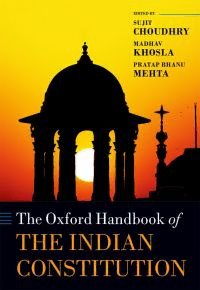
The Oxford Handbook of the Indian Constitution PDF
Preview The Oxford Handbook of the Indian Constitution
Title Page Page: 1 Copyright Page Page: 1 Acknowledgements Page: 1 Contents Page: 1 Table of Cases Page: 1 Table of Legislation Page: 1 List of Abbreviations Page: 1 Notes on Contributors Page: 1 1. Locating Indian Constitutionalism Page: 1 Part I History Page: 15 2. Constitutional Antecedents Page: 17 3. Indian Constitutionalism: Crisis, Unity, and History Page: 38 4. The Indian Founding: A Comparative Perspective Page: 55 Part II Negotiating Constitutionalism Page: 71 5. Constitutional Interpretation Page: 73 6. Law, Politics, and Constitutional Hegemony: The Supreme Court, Jurisprudence, and Demosprudence Page: 94 7. Constitutional Identity Page: 110 8. Constitutional Change: A Public Choice Analysis Page: 127 9. International Law and the Constitutional Schema Page: 143 Part III Constituting Democracy Page: 161 10. Citizenship Page: 163 11. Language Page: 180 12. Elections Page: 196 13. Emergency Powers Page: 213 14. Constitutional Amendment Page: 232 Part IV Separation of Powers Page: 251 15. Separation of Powers Page: 253 16. Legislature: Composition, Qualifications, and Disqualifications Page: 270 17. Legislature: Privileges and Process Page: 290 18. Executive Page: 307 19. Judicial Architecture and Capacity Page: 330 20. Judicial Independence Page: 349 21. Jurisdiction Page: 367 22. The Administrative and Regulatory State Page: 386 23. Tribunals Page: 412 24. Review of Administrative Action Page: 432 Part V Federalism Page: 449 25. The Federal Scheme Page: 451 26. Legislative Competence: The Union and the States Page: 466 27. Inter-State Trade, Commerce, and Intercourse Page: 487 28. Inter-State River Water Disputes Page: 502 29. Fiscal Federalism Page: 521 30. Asymmetric Federalism Page: 540 31. Local Government Page: 560 Part VI Rights—Structure and Scope Page: 579 32. Rights: Breadth, Scope, and Applicability Page: 581 33. Horizontal Effect Page: 600 34. Writs and Remedies Page: 614 35. Savings Clauses: The Ninth Schedule and Articles 31A–C Page: 627 36. Directive Principles of State Policy Page: 644 37. Public Interest Litigation Page: 662 38. The Constitutionalisation of Indian Private Law Page: 680 Part VII Rights—Substance and Content Page: 697 39. Equality: Legislative Review under Article 14 Page: 699 40. Reservations Page: 720 41. Gender Equality Page: 742 42. Life and Personal Liberty Page: 756 43. Due Process Page: 777 44. Criminal Law and the Constitution Page: 794 45. Free Speech and Expression Page: 814 46. Assembly and Association Page: 834 47. Movement and Residence Page: 849 48. Profession, Occupation, Trade, or Business Page: 867 49. Secularism and Religious Freedom Page: 885 50. Personal Laws Page: 903 51. Minority Educational Institutions Page: 921 52. Property Page: 943 Part VIII The Government’s Legal Personality Page: 965 53. Government Contracts Page: 967 54. Sovereign Immunity Page: 985 55. Public Employment and Service Law Page: 1001 Epilogue Page: 1017 56. The Indian Constitution Seen from Outside Page: 1019 Index Page: 1033
Description: